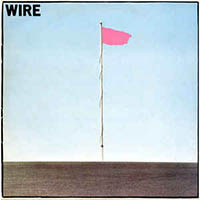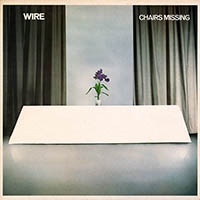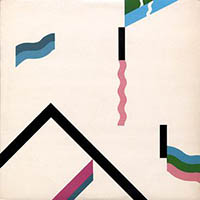 Certainly the deluxe edition re-issues are part of their time. Can't help that.
Certainly the deluxe edition re-issues are part of their time. Can't help that.
You know what they say of the younger fans of Green Day, on the occasion of their first listen to The Clash? "Golly, they sound just like Green Day!" ...
One of the weirder things is revisiting old men's records and realising that their leaps forward 40-odd years ago did the spade-work for mega-selling buttonhead bands by the hundred. I mean, come on. The late '80s and mid-'90s Britpop thing owes a huge debt to Wire.
What is astonishing here, apart from the vibrant inyerfaceness of the pre-"Pink Flag" demos (recorded between May and August 1977), is that, like The Buzzcocks and The Clash, or Siouxsie and the Banshees around this time, how broadly creative Wire were over such a short space of time. Like The Clash and the Banshees, Wire were part of the punk burst, but didn't rely on its DNA.
 Box sets usually harbour the TV appearances, the Peel Sessions and a few other sundries like B-Sides and the odd live gig. Wire have already released some fine live gigs of the period, and their TV appearances, and the Beeb released all their Peel Sessions over 30 years ago.
Box sets usually harbour the TV appearances, the Peel Sessions and a few other sundries like B-Sides and the odd live gig. Wire have already released some fine live gigs of the period, and their TV appearances, and the Beeb released all their Peel Sessions over 30 years ago.
What Wire present, in three rather super book/boxes is three snapshots of the band; their demo sessions, which the band either develop, or discard. Another thing is that, despite musical differences, Bruce Gilbert is well and truly included.
You get a clearer picture of the balance within the band (the drummer, Robert Grey, appears like the chap who variously spreads oil on troubled waters, or keeps well out of the way); in other words, while certain bands have a tendency to airbrush their history, Wire are frank and open (which, for a band who are remarkable by their ability to  survive and prosper while avoiding the usual public platforms) is damned remarkable.
survive and prosper while avoiding the usual public platforms) is damned remarkable.
Certainly, if you put on the demos first, rather than revisit your youth of yesteryear, you can see instantly - and I mean instantly - why this band were signed.
And, in fact, if you were to hear these demos today, from an unknown band, you'd want to sign them yourself, or take steps to make sure Big Music pounced on them - because they sound fresh and vital and NOW; sardonic, intelligent, contemptuous and connected to our culture ... and frankly, I can't think of that many bands populated by folk under the age of 30 who come close.
I mean, I'm sure there must be some ...
Formed as one thing, the rather wonderful notes by Graham Duff relate, their widdly-widdly guitarist (who appeared to think the band was there so he could get hammered and fight the band's small audiences) managed to put himself in hospital after trying to nick another band's amp and toppling down the stairs. The four remaining men (Lewis, Gilbert, Newman and Grey) found themselves with a creative freedom they never knew they needed.
Punk, of course, by 1977, was more or less over as a social imperative, and beginning to drag cliches like the chains lugged by Marley's ghost. Wire (as captured on the 'Live at the Roxy' CD previously released by pinkflag) had found themselves in a moment, a place, and they knew it couldn't last, and sought to further their palette.
"Pink Flag" was released in November 1977; the demos on "Chairs Missing" show the band rehearsing new material between December 1977 and April 1978; "Chairs Missing" was recorded in May and released in August; they were recording the demos for '154' in December... essentially, three classic LPs sorted out in, at most, two years.
I repeat, if you've never heard Wire, and if you hear any of these demos now (six separate sessions in total, and I'll get to the LPs in a tick) you'd be beside yourself, juices and heat flowing, in a heartbeat. See, if you know "Pink Flag" you can see the link to punk; however their first three demo sessions make it more apparent how the band - a group whose individuality combines to construct the concerted beauty and savagery of their music - was possessed of a strong desire to harness their initial trajectory and disgusted force which punk offered, and develop themselves into a place beyond punk.
For many people, especially those with their head in the '77 rut, "Pink Flag" is the best thing they ever did (such folk have inevitably never heard "Send"); "Chairs Missing" is the prime favourite among my friends, and '154' regarded as "difficult" (which I spose it kind of is) ...
So, yes, alright if you must, you can hear elements of Eno and even 999 or The Clash (a couple of tracks from the Fourth Demo Sessions you could play to a Strummer fan not enamoured of Wire and convince them they were Clash out-takes), but really ... like The Birthday Party, it's what you can't hear which is the key to Wire.
First, Wire were just like many punk bands - in the sense that they're (still) bloody-minded and contemptuous - bordering on quixotic - of the ordinary. So their deliberate tendency away from the punk uniforms in 1977 is entirely in keeping - as is their intent to get up the noses of as many 'straights' as possible. Which means that their trajectory is all the more remarkable. Had the band never reformed their achievement would have been superb. As it is...
Second, you hear less and less the influences of chainsaw punk and yelly lyrics as the band become increasingly competent (bang goes the "one chord wonder" myth), and the more Mike Thorne's influence becomes apparent. Thorne was their producer, the guy who first introduced them to pedals (and credited with "flute, staircase" on one song on "Pink Flag").
By "Chairs Missing" he plays on 13 of the songs they released around this time, his sounds contributing hugely to how Wire perceived themselves; as a consequence, although it's his production on "154" (with less of his overt musical contribution) you can see how the band have seized on multiple rungs to propel themselves forward.
In terms of influence, you can certainly hear their pawprints on (say) The Cure, Siouxsie and the Banshees, Blur and even Goawaysis. To name a bare handful.
While the internet forums often debate this, "are Wire a pop band" etc, the answer is that they're simply what they are. Sometimes they come out like a maddened alley cat (the "Read and Burn" EPs, and the 'Send' LP) and others they're in some pop landscape... but no matter where they are there's always this huge slam of sound behind them, deceptive as a tidal wave out to sea, heading landwards... and yet they're capable of the most elegant, subtle pop ("Outdoor Miner") ...
Genuine musical differences (makes a change, I know) stretched the band too far apart in the end and the separation, when it came in 1980, seemed inevitable. And now we must consider how the past has impacted on our grizzly present...
Old gits may recall the Buzzcocks had also split by 1981; the difference between them and Wire is that the 'cocks have recorded new LPs, but the bulk of their live set is from their first singles and three LPs; whereas Wire have very, very rarely performed any of their old stuff...
Reforming in the mid-80s, Wire reinvented themselves, refusing to play any of their earlier songs; however, their touring support was Ex-Lion Tamers, whose set was entirely Wire songs from these first LPs. Let me tell you... if you like the Buzzcocks, and think their third studio LP was their best (because it allowed them to take their music welded to lyrics that much further into the terrain of art), you need these Wire boxes.
In closing, if you're one of these people who cling to your scratched old vinyl and dusty memories ... well, that's fine. I'll leave you to it, you wee-smelling old fart.
In fact, screw you, you useless miser: I'll quote the band's website; "Each album is presented as an 80-page hardback book – the size of a seven-inch, but obviously much thicker. After a special introduction by Jon Savage, Graham Duff provides insight into each album. These texts include recording details, lyrics, and brand-new interviews with Colin Newman, Graham Lewis, Robert Grey and Bruce Gilbert.
The original album is presented on its own CD, and is accompanied by additional discs that feature relevant extra tracks: singles; B-sides; demos; and many previously unreleased songs. Pink Flag is a two-CD set; "Chairs Missing" and "154" have three CDs each. All audio has been painstakingly remastered – or, in some cases, mastered for the first time!
This stunning set of presentations includes a range of images from the archive of Annette Green. Wire’s official photographer during this period, Green also shot the covers for Pink Flag and Chairs Missing. Promotional and informal imagery – in colour and black and white – is featured throughout the books. Most of the photographs have not been seen for 40 years – and many have never been published anywhere before."
Had Wire been able to issue these packages back in the day, perhaps as limited editions, with the high quality racket and sonic depth and depravity, they would have done so.
Now that I've deafened myself and scared away the neighbour cats, possums and everything which crawls and flaps, I live in hope that Wire's next series of reissues/ special editions will be their Mute back catalogue - all six LPs deserve this treatment.
Either way, get yer wallet out.






 - all of them
- all of them

